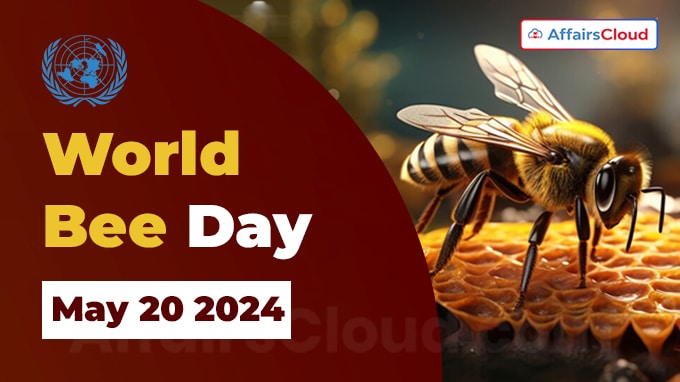 The United Nations (UN) World Bee Day is annually observed across the globe on 20 May to raise awareness about the importance of bees and beekeeping globally and the significance of pollinators, the threats they face, and their contribution to sustainable development.
The United Nations (UN) World Bee Day is annually observed across the globe on 20 May to raise awareness about the importance of bees and beekeeping globally and the significance of pollinators, the threats they face, and their contribution to sustainable development.
- World Bee Day 2024 was focused on the theme “Bee Engaged with Youth.”
Note: The 2024 theme highlights the importance of involving young people in beekeeping and pollinator conservation efforts.
Significance:
i.This Day highlights the importance of adopting pollinator-friendly agricultural production practices.
- It is to protect bees and other pollinators while contributing to agrifood systems’ resilience, sustainability, and efficiency.
ii.It emphasises the critical role of bees and pollinators, which would significantly contribute to solving global food supply problems and eliminating hunger in developing countries.
iii.The 2024 campaign aims to raise awareness among youth and others about the essential role of bees and other pollinators in agriculture, ecological balance, and biodiversity preservation.
Background:
i.World Bee Day was proposed by the Republic of Slovenia, with the support of Apimondia, at the Food and Agriculture Organization of the UN (FAO) Regional Conference for Europe in 2016.
- Apimondia is the International Federation of Beekeepers’ Association.
ii.In 2017, the proposal for World Bee Day was submitted for consideration at the 40th Session of the FAO Conference.
iii.On 20 December 2017, the UN General Assembly (UNGA) adopted the resolution A/RES/72/211, proclaiming 20 May of every year as World Bee Day.
iv.The 1st World Bee Day was observed on 20 May 2018.
Why May 20?
May 20 coincides with the birthday of Anton Janša of Slovenia, a pioneer of modern apiculture (beekeeping) techniques in the 18th century.
What is Apiculture?
Apiculture is the science of raising or maintaining colonies of bees and their hives (beekeeping).
- The word “apiculture” comes from the Latin word, apis, which means bee.
Importance of Bees and Other Pollinators:
i.Bees are integral to maintaining ecological balance and biodiversity.
ii.Their pollination (essential for ecosystem survival) activities support ecosystems, plant species, and genetic diversity.
iii.Bees and other pollinators such as butterflies, bats, and hummingbirds are essential for pollination, which is crucial for food production.
iv.Bees are vital in producing high-quality foods like honey, royal jelly, and pollen.
- They also provide valuable products for healthcare, such as beeswax and propolis.
Note: 1 million flowers and 50,000 bee flights are needed to produce 1 kilogram (kg) of honey.
The Threats to Pollinators:
i.Bees and other pollinators are increasingly endangered by human activities.
- Intensive monoculture farming and improper pesticide use threaten pollinators.
ii.These practices reduce access to food and nesting sites, expose bees to harmful chemicals, and weaken their immune systems.
Key Facts:
i.Nearly 90% of the world’s wild flowering plants and over 75% of the world’s food crops depend on animal pollination.
- It contributes to 35% of global agricultural land.
ii.Importantly, bees and other pollinators are responsible for pollinating nearly three-quarters of plants that produce 90% of the world’s food.
2024 Events:
The Government of Slovenia and FAO organise an International forum for action on sustainable beekeeping and pollination entitled “Bees for people, planet and peace,” a biennial event from 22-23 May 2024 in Ljubljana, Slovenia.
About Food and Agricultural Organisation (FAO):
Director-General– QU Dongyu
Headquarters– Rome, Italy
Established in– 1945
FAO is a specialized agency of the UN that leads international efforts to defeat hunger.




